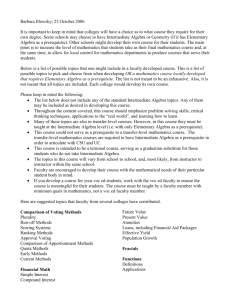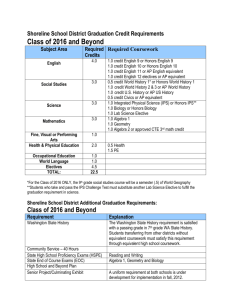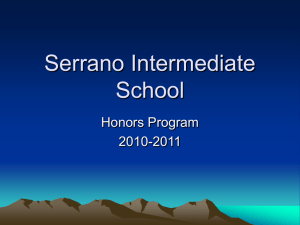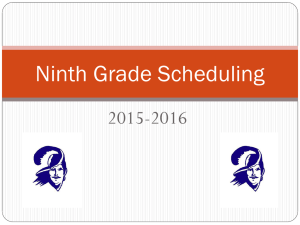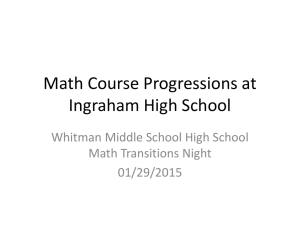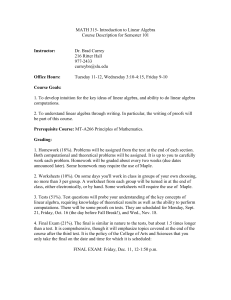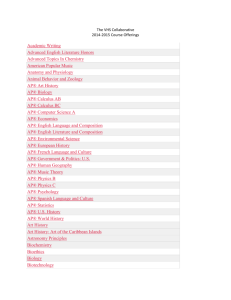High School Graduation
advertisement
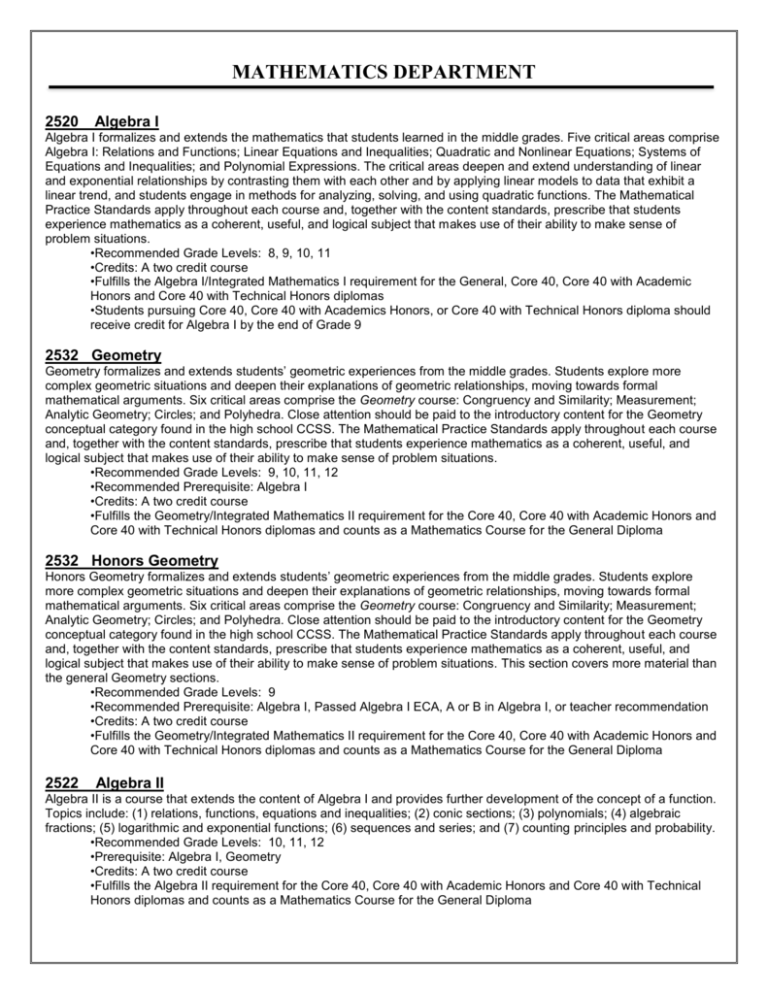
MATHEMATICS DEPARTMENT 2520 Algebra I Algebra I formalizes and extends the mathematics that students learned in the middle grades. Five critical areas comprise Algebra I: Relations and Functions; Linear Equations and Inequalities; Quadratic and Nonlinear Equations; Systems of Equations and Inequalities; and Polynomial Expressions. The critical areas deepen and extend understanding of linear and exponential relationships by contrasting them with each other and by applying linear models to data that exhibit a linear trend, and students engage in methods for analyzing, solving, and using quadratic functions. The Mathematical Practice Standards apply throughout each course and, together with the content standards, prescribe that students experience mathematics as a coherent, useful, and logical subject that makes use of their ability to make sense of problem situations. •Recommended Grade Levels: 8, 9, 10, 11 •Credits: A two credit course •Fulfills the Algebra I/Integrated Mathematics I requirement for the General, Core 40, Core 40 with Academic Honors and Core 40 with Technical Honors diplomas •Students pursuing Core 40, Core 40 with Academics Honors, or Core 40 with Technical Honors diploma should receive credit for Algebra I by the end of Grade 9 2532 Geometry Geometry formalizes and extends students’ geometric experiences from the middle grades. Students explore more complex geometric situations and deepen their explanations of geometric relationships, moving towards formal mathematical arguments. Six critical areas comprise the Geometry course: Congruency and Similarity; Measurement; Analytic Geometry; Circles; and Polyhedra. Close attention should be paid to the introductory content for the Geometry conceptual category found in the high school CCSS. The Mathematical Practice Standards apply throughout each course and, together with the content standards, prescribe that students experience mathematics as a coherent, useful, and logical subject that makes use of their ability to make sense of problem situations. •Recommended Grade Levels: 9, 10, 11, 12 •Recommended Prerequisite: Algebra I •Credits: A two credit course •Fulfills the Geometry/Integrated Mathematics II requirement for the Core 40, Core 40 with Academic Honors and Core 40 with Technical Honors diplomas and counts as a Mathematics Course for the General Diploma 2532 Honors Geometry Honors Geometry formalizes and extends students’ geometric experiences from the middle grades. Students explore more complex geometric situations and deepen their explanations of geometric relationships, moving towards formal mathematical arguments. Six critical areas comprise the Geometry course: Congruency and Similarity; Measurement; Analytic Geometry; Circles; and Polyhedra. Close attention should be paid to the introductory content for the Geometry conceptual category found in the high school CCSS. The Mathematical Practice Standards apply throughout each course and, together with the content standards, prescribe that students experience mathematics as a coherent, useful, and logical subject that makes use of their ability to make sense of problem situations. This section covers more material than the general Geometry sections. •Recommended Grade Levels: 9 •Recommended Prerequisite: Algebra I, Passed Algebra I ECA, A or B in Algebra I, or teacher recommendation •Credits: A two credit course •Fulfills the Geometry/Integrated Mathematics II requirement for the Core 40, Core 40 with Academic Honors and Core 40 with Technical Honors diplomas and counts as a Mathematics Course for the General Diploma 2522 Algebra II Algebra II is a course that extends the content of Algebra I and provides further development of the concept of a function. Topics include: (1) relations, functions, equations and inequalities; (2) conic sections; (3) polynomials; (4) algebraic fractions; (5) logarithmic and exponential functions; (6) sequences and series; and (7) counting principles and probability. •Recommended Grade Levels: 10, 11, 12 •Prerequisite: Algebra I, Geometry •Credits: A two credit course •Fulfills the Algebra II requirement for the Core 40, Core 40 with Academic Honors and Core 40 with Technical Honors diplomas and counts as a Mathematics Course for the General Diploma 2564 Pre-calculus/Trigonometry Pre-Calculus/Trigonometry blends the concepts and skills that must be mastered before enrollment in a college-level calculus course. The course includes the study of (1) relations and functions, (2) exponential and logarithmic functions, (3) trigonometry in triangles, (4) trigonometric functions, (5) trigonometric identities and equations, (6) polar coordinates and complex numbers, (7) sequences and series and (8) data analysis. Also covered are the translations of axes, vectors, matrices, determinants, exponential and logarithmic functions. The second semester will emphasize trigonometric relationships from right triangles to circular functions. A graphing calculator is beneficial when taking this course. Time will be allowed for realistic applications. •Recommended Grade Levels: 11, 12 •Recommended Prerequisite: Algebra I, Geometry, and Algebra II •Credits: A two credit course •Counts as a Mathematics Course for the General, Core 40, Core 40 with Academic Honors and Core 40 with Technical Honors diplomas 2562 Calculus AB, (Advanced Placement) Calculus AB, Advanced Placement is a course that provides students with the content established by the College Board. Topics include: (1) functions, graphs, and limits: analysis of graphs, limits of functions, asymptotic and unbounded behavior, continuity as a property of functions (2) derivatives: concepts of the derivative, derivative at a point, derivative as a function, second derivatives, application and computation of derivatives, and (3) integrals: interpretations and properties of definite integrals, applications of integrals, fundamental theorem of calculus, techniques of anti-differentiation, and numerical approximations to definite integrals. The use of graphing technology is required. •Recommended Grade Level: 12 •Recommended Prerequisite: Pre-Calculus •Recommended Grade Level: Grades 12 •Credits: A two credit course •Counts as a Mathematics Course for the General, Core 40, Core 40 with Academic Honors and Core 40 with Technical Honors diplomas •Students enrolled in this course will be required to take the AP exam. 2572 Calculus BC, (Advanced Placement) Calculus BC, Advanced Placement is a course that provides students with the content established by the College Board. Topics include: (1) functions, graphs, and limits: analysis of graphs, limits of functions, asymptotic and unbounded behavior, continuity as a property of functions, and parametric, polar, and vector functions (2) derivatives: concept of the derivative, derivative at a point, derivative as a function, second derivatives, applications of derivatives and computation of derivatives, (3) integrals: interpretations and properties of definite integrals, applications of integrals, fundamental theorem of calculus, techniques and applications of anti-differentiation, and numerical approximations to definite integrals, and (4) polynomial approximations and series: concept of series, series of constants, and Taylor series. The use of graphing technology is required. •Recommended Grade Level: 12 •Prerequisite: Pre-Calculus and recommendation from instructor •Credits: A two credit course •Counts as a Mathematics Course for the General, Core 40, Core 40 with Academic Honors and Core 40 with Technical Honors diplomas •Students enrolled in this course will be required to take the AP exam. 2560 Math Lab Mathematics Lab provides students with individualized instruction designed to support success in completing mathematics coursework aligned with Indiana’s Academic Standards for Mathematics. • Recommended Grade Levels: 9, 10, 11, 12 • Credits: A one to eight credit elective course • Counts as an Elective for the General, Core 40, Core 40 with Academic Honors and Core 40 with Technical Honors diplomas •*This course should be taken one semester a year until the student has successfully passed the Algebra I End-of-Course Assessment. 2546 Probability and Statistics Probability and Statistics includes the concepts and skills needed to apply statistical techniques in the decision-making process. Topics include: (1) descriptive statistics, (2) probability, and (3) statistical inference. Practical examples based on real experimental data are used throughout. Students plan and conduct experiments or surveys and analyze the resulting data. The use of graphing calculators and computer programs is encouraged. Rossville High School 3 • Recommended Grade Level: 12 • Recommended Prerequisite: Algebra II • Credits: A one credit first semester course • Counts as a Mathematics Course for the General, Core 40, Core 40 with Academic Honors and Core 40 with Technical Honors diplomas 2530 Finite Mathematics Finite Mathematics is an umbrella of mathematical topics. It is a course designed for students who will undertake higherlevel mathematics in college that may not include calculus. Topics include: (1) counting techniques, (2) matrices, (3) recursion, (4) graph theory, (5) social choice, (6) linear programming, and (7) game theory. Technology, such as computers and graphing calculators, should be used frequently. • Recommended Grade Level: 12 • Recommended Prerequisite: Algebra II • Credits: A one credit second semester course • Counts as a Mathematics Course for the General, Core 40, Core 40 with Academic Honors and Core 40 with Technical Honors diplomas Rossville High School 4
